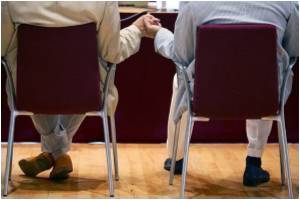Despite the ban of this weekend's march that has forced Serbia's gay activists to organise the gathering indoors, they have vowed to keep up with preparations for a parade next year.

Serbian authorities banned the parade on Wednesday, for the second year in a row, citing security threats.
Instead, about a hundred activists and gay rights supporters gathered at a Belgrade conference hall.
Instead of marching, the activists took to the street only to sit on the pavement outside the hall, waving rainbow flags and holding signs with the date set for the next year's parade, September 28.
"We hope the authorities will have enough time to enable us in a year to walk a 970-step long parade" in Belgrade, Miletic said, alluding to the distance of the planned march.
Dozens of policemen, some of them in riot gear, were positioned near the hall and along the central streets of the Serbian capital.
Advertisement
For Marin, a 28-year old designer from Belgrade, the gathering was "nice, but sad".
Advertisement
Gay activist Jelena, who said her family had disowned her after coming out as lesbian, warned that in "highly conservative society like Serbia, the step-by-step approach might be the smartest, but just leads up to frustration."
"I do not want to parade naked with my girlfriend in the street, I just want to be able for us to walk hand in hand," she said, resigned.
Swedish Minister for European Affairs Birgitta Ohlsson who was supposed to join the march, said she was disappointed with the ban, describing it as a "discrimination".
"The European Union will not accept inequality and homophobia," Ohlsson warned.
She called on Serbia, as a EU membership candidate country, to "deliver" in the field of human and minority rights issues and freedom of speech and assembly.
"It is a duty of the Serbian government to fulfil its obligation in the field of human rights," she said.
Serbia became an EU candidate member in March and is hoping to get a date to start accession talks this year.
Serbia's Prime Minister Ivica Dacic said "security information gathered by the police led us to believe there would be bloodshed" on Belgrade streets if the parade was held.
In 2010, Serbia held its first gay pride parade in a decade but violent riots followed. More than 150 people, mostly police officers, were wounded in clashes between security forces and ultra-nationalists and hooligans.
Last year the parade was banned at the last minute by the police due to security concerns as a number of ultra-nationalist groups had announced they planned to disrupt the march.
Source-AFP









